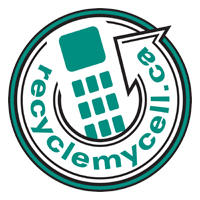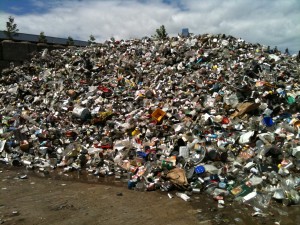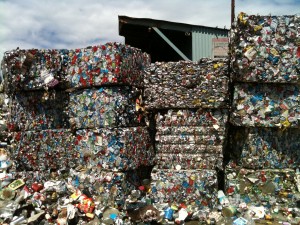How Things Get Recycled
 Ridge Meadows Recycling has been working with the City of Maple Ridge since its beginnings in 1972. Starting a residential recycling collection program in 1980, RMRS collected curbside and apartment recycling from Maple Ridge residents for 45 years before transitioning to direct collection services by Recycle BC in 2025. RMRS also collects and processes different materials at the Maple Ridge Recycling Depot. This enables us to keep jobs in the community and maintain control over processing costs, the cleanliness of our product, and, to some extent, the end markets of our recyclable materials. Recycle BC markets the printed paper and packaging that we collect at the Depot. The local market for recycled materials fluctuates constantly in response to supply & demand. Within the last number of years, North American paper mills have shut down as overseas markets, taking advantage of returning empty shipping containers and low-cost labour, offer higher prices for our commodities and become steep competition to local manufacturers.
Ridge Meadows Recycling has been working with the City of Maple Ridge since its beginnings in 1972. Starting a residential recycling collection program in 1980, RMRS collected curbside and apartment recycling from Maple Ridge residents for 45 years before transitioning to direct collection services by Recycle BC in 2025. RMRS also collects and processes different materials at the Maple Ridge Recycling Depot. This enables us to keep jobs in the community and maintain control over processing costs, the cleanliness of our product, and, to some extent, the end markets of our recyclable materials. Recycle BC markets the printed paper and packaging that we collect at the Depot. The local market for recycled materials fluctuates constantly in response to supply & demand. Within the last number of years, North American paper mills have shut down as overseas markets, taking advantage of returning empty shipping containers and low-cost labour, offer higher prices for our commodities and become steep competition to local manufacturers.
From 1972 – 2014, we marketed all the recycling we collected directly to manufacturers. In 2014, the responsibility for recycling all residential printed paper and packaging shifted to an industry-created, not-for-profit society, Recycle BC (formerly MultiMaterial BC) through the province’s latest EPR stewardship program. Following the provincial government’s mandate, Recycle BC now funds the collection, processing, and shipping of items collected through curbside and recycling depot programs throughout the province.
In 2018, China effectively closed its doors to North American and European recycling loads by mandating an extremely low contamination threshold. Because of the way British Columbia has set up its recycling programs, it remains largely unaffected. Ridge Meadows Recycling remains committed to shipping to local markets whenever possible.
Recycle BC is one of a large number of organizations that are responsible for end-of-life programs in BC. For more information, check out the BC Recycles’ Recycling Handbook:
Here is an overview of what happens to some materials once they are dropped off at the Maple Ridge Recycling Depot:
Aluminum:
Clean and dirty scrap aluminum is collected and sold to companies making new products – recycling aluminum saves 95% of the electricity needed to produce aluminum from ore.
 Refundable containers are taken to an Encorp Depot for refund, then recycled into more cans.
Refundable containers are taken to an Encorp Depot for refund, then recycled into more cans.
Appliances:
Small appliances (coffee makers, list more, etc.) are collected and recycled as part of ElectroRecycle’s EPR program for Small Appliances and Power Tools.
From BC Recycles: “Electrical products are taken apart and separated into material types. Some materials such as copper and other metals are sent for smelting to recover the metals. Other materials such as plastics and glass are recycled/processed into commodities or reused.” www.electrorecycle.ca
Large appliances are checked for Freon and sold as scrap metal for recycling.
Beverage containers:
![]()
 Refundable containers are collected taken to Encorp Pacific through their beverage container EPR program.
Refundable containers are collected taken to Encorp Pacific through their beverage container EPR program.
From BC Recycles: “Aluminum cans are recycled into new cans within 6 weeks. Drink boxes and cartons are used in paper products and cardboard boxes. Glass is recycled into new bottles or turned into insulation, and plastic is used for new bottles, jugs, buckets, and more.” www.return-it.ca
Batteries:
![]() Household, rechargeable, small appliance, & button batteries are collected as part of an EPR program by Call2Recycle. These are picked up and sorted by Retriev Technologies in Trail then sent to different processors where the metals are separated, and the chemicals are reused.
Household, rechargeable, small appliance, & button batteries are collected as part of an EPR program by Call2Recycle. These are picked up and sorted by Retriev Technologies in Trail then sent to different processors where the metals are separated, and the chemicals are reused.
From BC Recycles: “The collected batteries are sent to recycling facilities where they are processed into reusable metals and materials. These are used to produce new batteries, stainless steel products and cement additives. None of the materials make their way into landfills.” www.call2recycle.ca
![]()
Car, motorcycle, and other lead-acid batteries from vehicles are collected at the Maple Ridge Recycling Depot and sold to Interstate Batteries who ships them to the Teck Cominco smelter in Trail. The lead and plastic (polypropylene) are extracted to make new batteries and other materials and the acid is processed for re-use in detergents or is neutralized and treated.
From BC Recycles: “All consumer lead-acid batteries can be recycled. They are found in items such as vehicles, trucks, motorcycles, boats, and RVs. All commercial lead-acid battery applications, including fork lifts, golf carts, solar and UPS systems are also collected and recycled.” www.recyclemybattery.ca
Cardboard:
 Corrugated cardboard is part of Recycle BC‘s Printed Paper & Packaging program. Cardboard is often recycled into “Kraft Paper” (brown paper bags), roofing paper, new cardboard boxes, and paper board.
Corrugated cardboard is part of Recycle BC‘s Printed Paper & Packaging program. Cardboard is often recycled into “Kraft Paper” (brown paper bags), roofing paper, new cardboard boxes, and paper board.
From BC Recycles: “Corrugated cardboard is recycled into cardboard, printed paper and paper packaging is recycled into boxes and other packaging” www.recyclinginbc.ca
Cell Phones:

Cell phones & accessories (chargers, ear buds, cords, etc.) are collected as part of an EPR program by Recycle My Cell. These are processed by Teck Cominco in Trail where the metals are separated and the chemicals are reused.
From BC Recycles: “Phones and accessories are sent to certified processing facilities, where they are separated based on whether or not they can be refurbished or reused. Phones that meet specific functionality criteria are refurbished and sold. Whether reused or recycled, your old phone stays out of the landfill.” www.recyclemycell.ca
Electronics (aka. “e-waste”):

 All TVs, computers and computer attachments, and other electronic or electrical equipment are accepted for recycling by Encorp Pacific as part of EPRA‘s Recycle My Electronics EPR program – no resale permitted. Most are shipped to the Teck Cominco smelter in Trail for separation & processing.
All TVs, computers and computer attachments, and other electronic or electrical equipment are accepted for recycling by Encorp Pacific as part of EPRA‘s Recycle My Electronics EPR program – no resale permitted. Most are shipped to the Teck Cominco smelter in Trail for separation & processing.
![]() From BC Recycles: “Through a variety of refining and smelting processes, materials reclaimed from unwanted electronics, such as metal, plastic, and glass are used as raw materials in the manufacturing of new products.” www.return-it.ca/electronics
From BC Recycles: “Through a variety of refining and smelting processes, materials reclaimed from unwanted electronics, such as metal, plastic, and glass are used as raw materials in the manufacturing of new products.” www.return-it.ca/electronics
Electronic Toys:
 Any toy with an electrical component is covered in this program, run by the Canadian Brandowners Residual Stewardship Corporation, including:
Any toy with an electrical component is covered in this program, run by the Canadian Brandowners Residual Stewardship Corporation, including:
- Plush Textiles with Electronics – electronic dolls and stuffed animals
- Metal or Hard Plastic Toys with Electronics
- Remote Control Vehicles
- Ride On Vehicles
- Hand Held Game Devices
- Gaming Devices with PC /TV
- Electronic Toy Promotional Items – like those sold with meals or other items marketed to children
Glass:
![]() A
A ll beverage containers have a deposit and are collected as part of the Beverage Container EPR program and returned to Encorp Pacific for refunds.
ll beverage containers have a deposit and are collected as part of the Beverage Container EPR program and returned to Encorp Pacific for refunds.
 From BC Recycles: “Glass beer and cider bottles are reused an average of 15 times. They are then recycled into new glass bottles and other glass products.” www.envirobeerbc.com
From BC Recycles: “Glass beer and cider bottles are reused an average of 15 times. They are then recycled into new glass bottles and other glass products.” www.envirobeerbc.com
 Other glass jars & bottles are part of Recycle BC‘s Printed Paper & Packaging program. In the past, we shipped our mixed glass to Envirogrit in Abbotsford to be made into fibreglass and contaminated glass was used as a gravel substitute.
Other glass jars & bottles are part of Recycle BC‘s Printed Paper & Packaging program. In the past, we shipped our mixed glass to Envirogrit in Abbotsford to be made into fibreglass and contaminated glass was used as a gravel substitute.
Household Hazardous Waste (HHW):
 Product Care runs a Hazardous Household Waste EPR program designed to reduce the amount of hazardous waste being dumped into the sewer system. After collection, solvents, pesticides & flammables are shipped in tubskids to Paint Plus in Surrey, where they are sorted & batched for safe incineration.
Product Care runs a Hazardous Household Waste EPR program designed to reduce the amount of hazardous waste being dumped into the sewer system. After collection, solvents, pesticides & flammables are shipped in tubskids to Paint Plus in Surrey, where they are sorted & batched for safe incineration.
From BC Recycles: “flammable liquids and gasoline are used as alternative fuels.”
Light Bulbs, Tubes, & Fixtures:
![]() As part Product Care‘s “Light Recycle” EPR program, all light bulbs, including flourescent, halogen, incandescent, and LED, as well as lamps, light fixtures, chandeliers, and flashlights can be recycled. Lights from businesses are also accepted! Flourescent light bulbs & tubes are collected and shipped to Ontario for processing where a water bath is used to recover the gas and the glass is recycled.
As part Product Care‘s “Light Recycle” EPR program, all light bulbs, including flourescent, halogen, incandescent, and LED, as well as lamps, light fixtures, chandeliers, and flashlights can be recycled. Lights from businesses are also accepted! Flourescent light bulbs & tubes are collected and shipped to Ontario for processing where a water bath is used to recover the gas and the glass is recycled.
From BC Recycles: “Metal is recycled through the metal recycling industry. Mercury/phosphor powder is sent for mercury retort to recover the mercury. Glass is recovered and reused. Non-PCB lighting ballasts are recycled through the metal recycling industry.”
Metal:
All scrap metal, including large appliances, are stripped of non-ferrous metals, including aluminum, copper, brass, copper wire, breakage, motors and compressors.
 Tin & aluminum cans are part of Recycle BC’s Printed Paper & Packaging program. Often, light steel is melted and formed into rebar or flat bar.
Tin & aluminum cans are part of Recycle BC’s Printed Paper & Packaging program. Often, light steel is melted and formed into rebar or flat bar.
From BC Recycles: “metal packaging becomes construction material” www.recyclinginbc.ca
Motor oil, oil containers and filters, & antifreeze:
 These are all collected at the depot through Interchange Recycling‘s Used Motor Oil EPR program.
These are all collected at the depot through Interchange Recycling‘s Used Motor Oil EPR program.
From BC Recycles: “Oil is re-refined into new oil or used as fuel in pulp mills an asphalt plants. Antifreeze is processed into new antifreeze. Filters are crushed and smelted into new steel products while oil and antifreeze containers are processed into new oil containers or other plastic products.” www.usedoilrecycling.com/bc
Paper:
 All paper (office paper, newspaper, magazines, catalogues, etc.) is collected as part of Recycle BC’s Printed Paper & Packaging program. It is used to produce higher grades of office or tissue paper. In the past, we shipped newsprint to CK Fibre in Langley, where it was made into egg cartons and drink trays for Tim Hortons restaurants. The paper is de-inked and sold to markets across North America, mostly California where there is a legislated requirement for newspaper to have 40% post-consumer waste content.
All paper (office paper, newspaper, magazines, catalogues, etc.) is collected as part of Recycle BC’s Printed Paper & Packaging program. It is used to produce higher grades of office or tissue paper. In the past, we shipped newsprint to CK Fibre in Langley, where it was made into egg cartons and drink trays for Tim Hortons restaurants. The paper is de-inked and sold to markets across North America, mostly California where there is a legislated requirement for newspaper to have 40% post-consumer waste content.
From BC Recycles: “Corrugated cardboard is recycled into cardboard, printed paper and paper packaging is recycled into boxes and other packaging” www.recyclinginbc.ca
Paint:
 Paint is collected as part of Product Care‘s Paint EPR program. Any community groups interested in picking up used paint for projects, call us at 604-463-5545.
Paint is collected as part of Product Care‘s Paint EPR program. Any community groups interested in picking up used paint for projects, call us at 604-463-5545.
Product Care has a great blog on How Leftover Paint is Recycled.
From BC Recycles: “Latex paint is recycled into new paint or used as raw material. Oil-based paints, flammable liquids and gasoline are used as alternative fuels.”
Plastics:

 Plastics are collected as part of Recycle BC‘s Printed Paper & Packaging program. Merlin Plastics on Annacis Island either shreds it or melts the plastic down into pellets to be sold & used for the manufacture of non-food bearing products (bags, bottles, blue boxes, piping, etc.).
Plastics are collected as part of Recycle BC‘s Printed Paper & Packaging program. Merlin Plastics on Annacis Island either shreds it or melts the plastic down into pellets to be sold & used for the manufacture of non-food bearing products (bags, bottles, blue boxes, piping, etc.).
From BC Recycles: “plastic packaging is used in household goods, packaging, and building material” www.recyclinginbc.ca
![]()
![]() Plastic beverage bottles are shipped to Encorp for refunds through their Beverage Container EPR program.
Plastic beverage bottles are shipped to Encorp for refunds through their Beverage Container EPR program.
From BC Recycles: “plastic is used for new bottles, jugs, buckets and more.” www.return-it.ca
Smoke & Carbon Monoxide Alarms:
![]() Used & expired smoke, carbon monoxide, and combination alarms are collected under ProductCare’s AlarmRecycle program.
Used & expired smoke, carbon monoxide, and combination alarms are collected under ProductCare’s AlarmRecycle program.
From BC Recycles: “Plastics and metals from smoke and CO alarms are recovered and radioactive components are disposed of at licensed facilities.”
Styrofoam (Polystyrene):
 Styrofoam is collected as part of Recycle BC‘s Printed Paper & Packaging program. It was previously shipped to Foam Only, located in Coquitlam. This company condenses styrofoam for shipping and makes it into finished products such as crown molding or baseboards for home decor, and picture frames.
Styrofoam is collected as part of Recycle BC‘s Printed Paper & Packaging program. It was previously shipped to Foam Only, located in Coquitlam. This company condenses styrofoam for shipping and makes it into finished products such as crown molding or baseboards for home decor, and picture frames.
From BC Recycles: “foam is recycled into picture frames” www.recyclinginbc.ca

Thermostats:
Thermostats and other mercury switches are collected as part of the Thermostat Recovery Program designed to safely collect and process the mercury contained within them.
From BC Recycles: “Thermostats are made up of plastics, metals, electronics, glass an dmercury, which are all 100% recyclable. Your used thermostat goes on to become a number of different products, including fibreglass, refined mercury and lower grade plastic and metal devices.”




